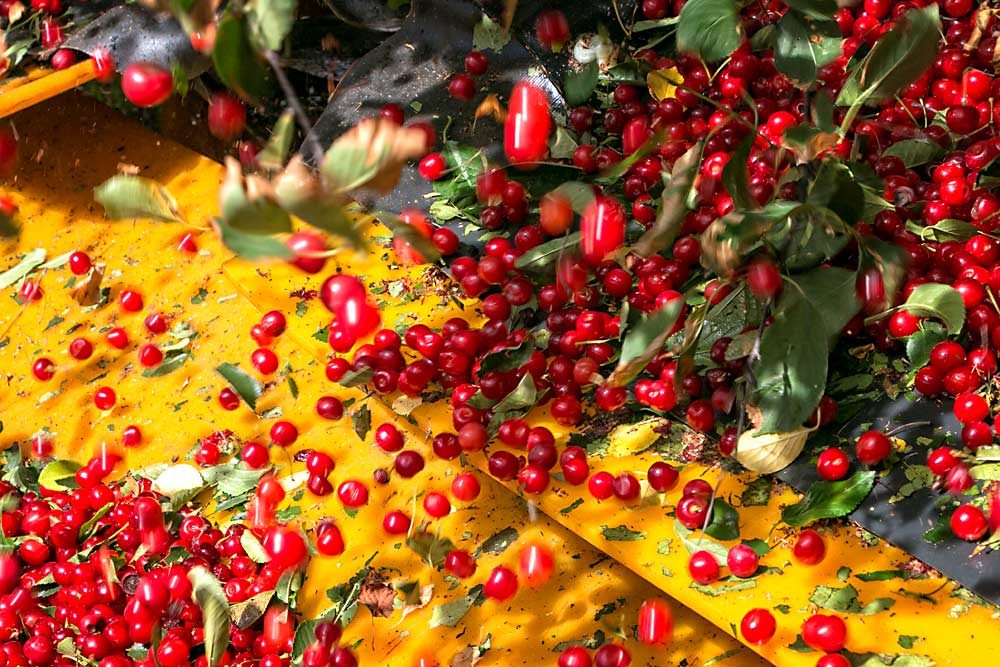
In the past few years, international trade has become a crucial challenge for the U.S. tart cherry industry: Imports are driving down domestic prices, and recent trade disputes have limited access to foreign markets, which can take years to open up and are tough to get back when they close.
The industry never regained all of the markets it lost after the near-total crop losses in 2002 and 2012, said Phil Korson, president of the Cherry Marketing Institute.
The U.S. industry has spent the past dozen years promoting the Montmorency tart cherry as a healthful “superfruit.” These efforts helped the industry break out of its traditional sales categories and expand into juice, dried and other products. But they had an unexpected downside: encouraging cheap imports from Turkey and other countries.

“These markets were built by America’s farmers, and we can compete with anyone in the world if trade is fair,” Korson said. “That is not the case right now.”
There are glimmers of hope, however. The domestic industry has won a few recent victories.
The U.S. Department of Agriculture bought $30 million worth of tart cherry products in 2019. The industry can’t rely on that kind of purchase every year, but it helped with the oversupply problem, Korson said.
In October, the U.S. Trade Representative started applying duties to several products imported from the European Union, among them tart cherry products in direct competition with U.S. cherries. Cherry juice and dried tart cherries from several European countries are now subject to an additional 25-percent tariff when they enter the country, according to the Cherry Industry Administrative Board.
A month earlier, the U.S. Department of Commerce made a preliminary ruling ordering Turkish exporters of dried tart cherries to escrow funds to cover a countervailing duty of 204 percent (to counteract Turkish subsidies) and an anti-dumping duty of 640 percent, according to Nels Veliquette, a member of the Dried Tart Cherry Trade Committee and chief financial officer of Cherry Ke, a Northwest Michigan producer.
The Dried Tart Cherry Trade Committee, made up of five U.S. producers of dried tart cherries, filed the anti-dumping and countervailing petitions in April 2019 to protest subsidized Turkish imports. The group claims imports have steeply undersold U.S. producers and held down prices in the last few years, giving Turkish producers an unfair advantage. Between 2016 and 2018, imports of dried tart cherries from Turkey more than tripled, from 413,893 pounds to 1.5 million pounds, according to CMI.
Veliquette said the preliminary ruling required importers of dried tart cherry products from Turkey to put money in an escrow account equal to the duties imposed. When the Commerce Department makes a final ruling (expected in January), the escrowed money will either be used to pay for the duties (if the U.S. industry wins) or will be returned to the importers, he said.
The preliminary ruling has already slowed down the flow of Turkish dried cherries, Veliquette said.
“Things are looking more positive right now,” he said. “We have a moral victory to point to. Moral victories are nice, but they don’t pay the bills.”
But Turkey may find other ways to penetrate the U.S. market.
“It’s whack-a-mole,” Veliquette said. “We have to be vigilant, which also means we have to continue to spend money to defend the markets we’ve built.”
And every dollar that goes into defending markets is a dollar that’s not spent on research that could benefit the domestic industry, he said.
Tart cherries are not currently included in USDA’s Market Facilitation Program, which the Trump administration is using to compensate producers of commodities that have been directly impacted by retaliatory tariffs. The industry has made its case for inclusion — with help from Congressional members on both sides of the aisle — and awaits a decision, Veliquette said.
“We got paid 15 cents a pound, on average, for fruit this year,” he said. “That’s the third year in a row. It costs about 30 cents a pound to produce a tart cherry. The Market Facilitation Program would return another 15 cents. It might help us get closer to breakeven.” •
—by Matt Milkovich
Related:
—Tart cherry growers feeling the squeeze
—Commerce Department rules in favor of U.S. tart cherry producers
—Tart growers target Turkey
—The art of tart






Leave A Comment